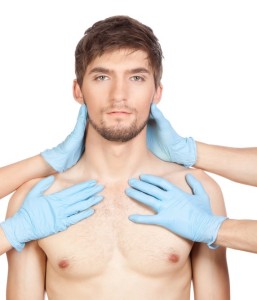The first time I contracted gonorrhea, which in my day was affectionately called The Clap, I was 20 years old and had just moved to West Hollywood, California. It was 1981, disco was still thumping in the bars, and the bath houses were packed. My dance card was filled.
 When I admitted my telltale symptoms to a friend, he directed me to the local clinic in the heart of the gay strip. The waiting area, filled to the brim with gay men, had the undeniable scent of Brut cologne and testosterone, and despite the circumstances we all cruised one another through sheepish glances.
When I admitted my telltale symptoms to a friend, he directed me to the local clinic in the heart of the gay strip. The waiting area, filled to the brim with gay men, had the undeniable scent of Brut cologne and testosterone, and despite the circumstances we all cruised one another through sheepish glances.
It was embarrassing but not the worst day of my life. The clinician touched me in private places with rubber gloves and the shot he gave me worked. Life went on.
No one told me I should be using condoms, not in the clinic and not among friends. The very suggestion would have been ludicrous. Half the fun of being gay was the blithe disregard for rubbers. We knew the symptoms of trouble and dealt with it accordingly. An STI (sexually transmitted infection) was an annoying rite of passage and little more. We had not yet met a virus that could harm us in any significant way.
During my early years of recreational sex in the busy gay mecca, I caught The Clap so many times I called it The Applause.
Which brings me to a common objection to the use of pre-exposure prophylaxis (PrEP) for the prevention of HIV transmission. Skeptics of the strategy warn that taking a pill to prevent HIV does not guard against other STI’s and therefore condoms must continue to be used.
When did avoiding every possible STI become the new goal for gay sexual behavior? Syphilis, chlamydia, and gonorrhea are all easily treated and cured. Scary campfire tales of a spreading superbug impervious to all treatment have failed to materialize. The very idea of getting The Clap again just makes me feel nostalgic.
No longer is avoiding HIV the prime objective; we must also now use a condom every time so that we are never exposed to, well, whatever. How many hoops must we jump through in order to fuck in a pleasurable way? We can’t win for losing.
I’m beginning to wonder if the avoidance of pleasure has become the real objective; after a generation of fear and mortality, we don’t see pleasure - and I mean sweaty nasty bodily fluid exploding pleasure - as a basic human need we can enjoy as gay men, much less deserve. Meanwhile, heterosexuals acquire STI’s or get pregnant with the same regularity as always. Our gay sin is always greater.
Whatever moderate concern we once had for contracting an STI (and empathy for those getting one) has been transformed into a fearsome judgment of any repercussions of gay sex, regardless of its actual threat to our health. It’s a shame-based, sex-negative ideology and it is painful to observe, particularly within my own community.
There are many ways to avoid HIV infection that can still give you an STI. That’s true. And every person should engage in sober reflection and make their own assessment of what risks they are willing to take. I am a proponent of “shoot the alligator closest to the boat,” meaning, prioritize the risk and act accordingly.
Gay men who take steps to avoid HIV practice a number of strategies: they choose PrEP, or limit themselves to oral sex with partners whom they don’t know, or they only top, or they know their partner is undetectable, or they are themselves on successful treatment. All of these methods can prevent HIV transmission but can still expose someone to an STI.
I consider the man who employs these strategies, and maintains a relationship with his health care provider to monitor any infections, a success story. I have no interest in telling him to jump through a few more hoops if he wants to be truly, totally, super safe from all of life’s ills. There is a cost to being human and of the pleasures we seek, whether it’s sex or fast cars or that second piece of cake.
Unfortunately, because the topic is gay sexuality, it tends to make some of those alligators appear much larger than they really are.
Mark







3 Comments
3 Comments